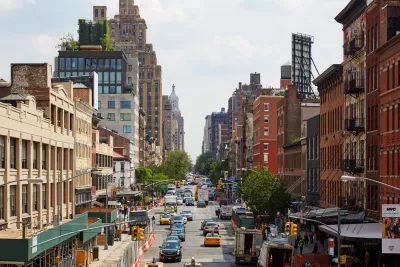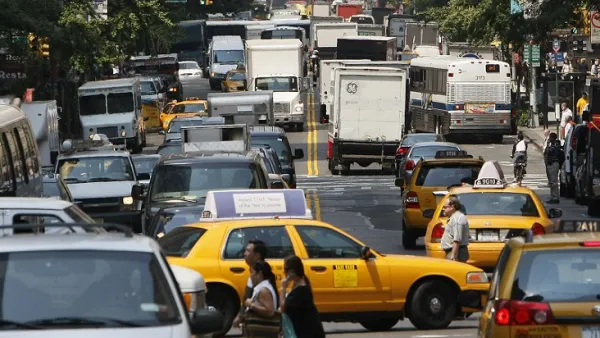An idea approved in 2019 which spent the last two years stuck in Trump and Covid limbo, will only now begin a slow march toward final approval.

"The MTA confirmed on Friday that it will take 16 more months to complete the required environmental assessment for congestion pricing," reports Dave Colon.
The idea of congestion pricing for a large section of Manhattan (a system also known as cordon pricing) has been floating on the fickle winds of political fortune for well over a decade. In 2008, the New York State Assembly killed a plan by then-New York Mayor Michael Bloomberg to implement cordon pricing in Manhattan with the help of federal funding made available during the Bush administration—money that eventually went to Los Angeles to fund the first toll lanes in Los Angeles County on several major freeways.
Congestion pricing in New York City seemed revenant in March 2019, when a rare alignment between then-Governor Andrew Cuomo, Mayor Bill de Blasio, and the New York State legislature broke the political logjam for congestion pricing, eventually winning a green light in April of the same year.
But by February 2020, the story had shifted to the obstacles presented by the Trump administration, before Covid added a new, larger obstacle to the ongoing delays caused by the Trump administration.
So what explains this latest setback? An agreement between the transit agency and the federal government, the MTA, the New York State DOT, and the New York City DOT has laid out a 16-month public outreach process: "a timeline that includes months of public meetings and briefings to determine if reducing driving into the central business district of Manhattan will be good for the environment and for long-suffering communities of color that have borne the brunt of decades of damage from the automobile."
As noted by Colon, the MTA officials had previously stated that the Environmental Assessment for congestion pricing in Manhattan would take only a few months. Mayor Bill de Blasio has since blasted the 16-month timeline as "ridiculous."
FULL STORY: MTA, Feds Promise Congestion Pricing Won’t Start For A Long, Long Time

Analysis: Cybertruck Fatality Rate Far Exceeds That of Ford Pinto
The Tesla Cybertruck was recalled seven times last year.

National Parks Layoffs Will Cause Communities to Lose Billions
Thousands of essential park workers were laid off this week, just before the busy spring break season.

Retro-silient?: America’s First “Eco-burb,” The Woodlands Turns 50
A master-planned community north of Houston offers lessons on green infrastructure and resilient design, but falls short of its founder’s lofty affordability and walkability goals.

Test News Post 1
This is a summary

Analysis: Cybertruck Fatality Rate Far Exceeds That of Ford Pinto
The Tesla Cybertruck was recalled seven times last year.

Test News Headline 46
Test for the image on the front page.
Urban Design for Planners 1: Software Tools
This six-course series explores essential urban design concepts using open source software and equips planners with the tools they need to participate fully in the urban design process.
Planning for Universal Design
Learn the tools for implementing Universal Design in planning regulations.
EMC Planning Group, Inc.
Planetizen
Planetizen
Mpact (formerly Rail~Volution)
Great Falls Development Authority, Inc.
HUDs Office of Policy Development and Research
NYU Wagner Graduate School of Public Service




























